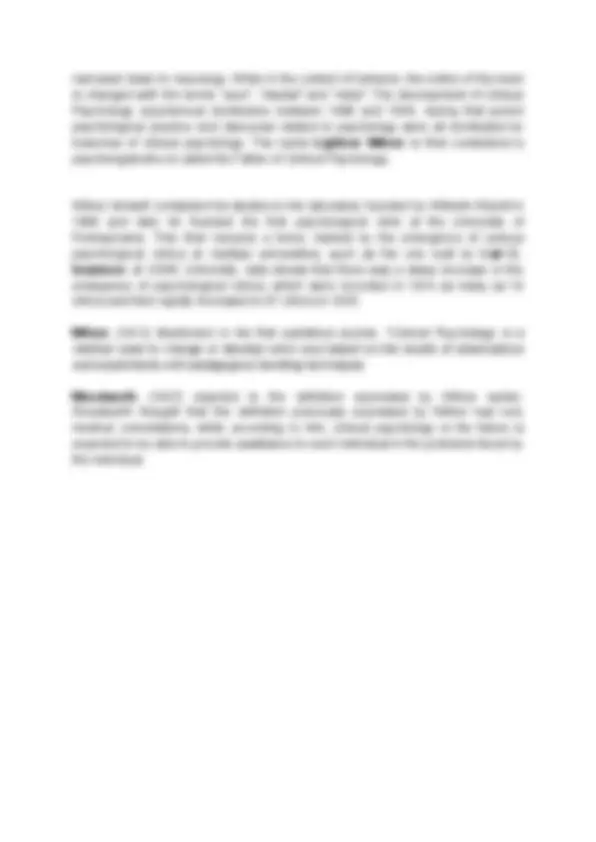



Study with the several resources on Docsity

Earn points by helping other students or get them with a premium plan


Prepare for your exams
Study with the several resources on Docsity

Earn points to download
Earn points by helping other students or get them with a premium plan
Community
Ask the community for help and clear up your study doubts
Discover the best universities in your country according to Docsity users
Free resources
Download our free guides on studying techniques, anxiety management strategies, and thesis advice from Docsity tutors
This Summary is about clinical psychology. (1 - 10)
Typology: Summaries
1 / 2

This page cannot be seen from the preview
Don't miss anything!


Clinical psychology is one of the various types of applied psychology which is still causing controversy. Both in terms of meaning and role when compared to the branch of mental medicine (Psychiatry). Many people understand and understand psychiatry much younger than clinical psychology. Philipp Melachton , proclaimed the existence of psychology as the substance of behavioral courses with the aim of completing: ● Body ● Angel ● Satan ● God All of which give rise to behavioral symptoms. Then in 1920, Watson emerged who wanted material in psychology that was based on objective (measurable and observable) scientific principles. But the will of Watson raises controversy among clinical psychologists, those who do not agree and share views with Watson then switch to a " humanistic. In a basic understanding, clinical psychology is a branch of psychology that applies and applies Abnormal Psychology as basic science. Meanwhile, Abnormal Psychology is a branch of psychology for Personality Psychology. Personality CLINICAL Psychology Abnormal Psychology PSYCHOLOGY Clinical Psychology of Children & the Elderly Clinical Psychology was born based on the opinion of Hippocrates who stated that every behavior, including symptoms of illness, originates from the brain. It's just that the meaning of "sourced from the brain" is still too broad in scope and was then
narrowed down to neurology. While in the context of behavior, the notion of the brain is changed with the terms "soul" , "mental" and "mind". The development of Clinical Psychology experienced dominance between 1896 and 1946, during that period psychological practice and discourse related to psychology were all dominated by branches of clinical psychology. The name Lightner Witner is then considered a psychologist who is called the Father of Clinical Psychology. Witner himself completed his studies in the laboratory founded by Wilhelm Wundt in 1896 and later he founded the first psychological clinic at the University of Pennsylvania. This then became a trend, marked by the emergence of various psychological clinics at multiple universities, such as the one built by Carl E. Seashore at IOWA University. data shows that there was a sharp increase in the emergence of psychological clinics, which were recorded in 1914 as many as 14 clinics and then rapidly increased to 87 clinics in 1935. Witner (1912) Mentioned in his first published journal, “Clinical Psychology is a method used to change or develop one's soul based on the results of observations and experiments with pedagogical handling techniques. Woodworth (1937) objected to the definition expressed by Witner earlier, Woodworth thought that the definition previously expressed by Witner had very medical connotations, while according to him, clinical psychology in the future is expected to be able to provide assistance to each individual in the problems faced by the individual.